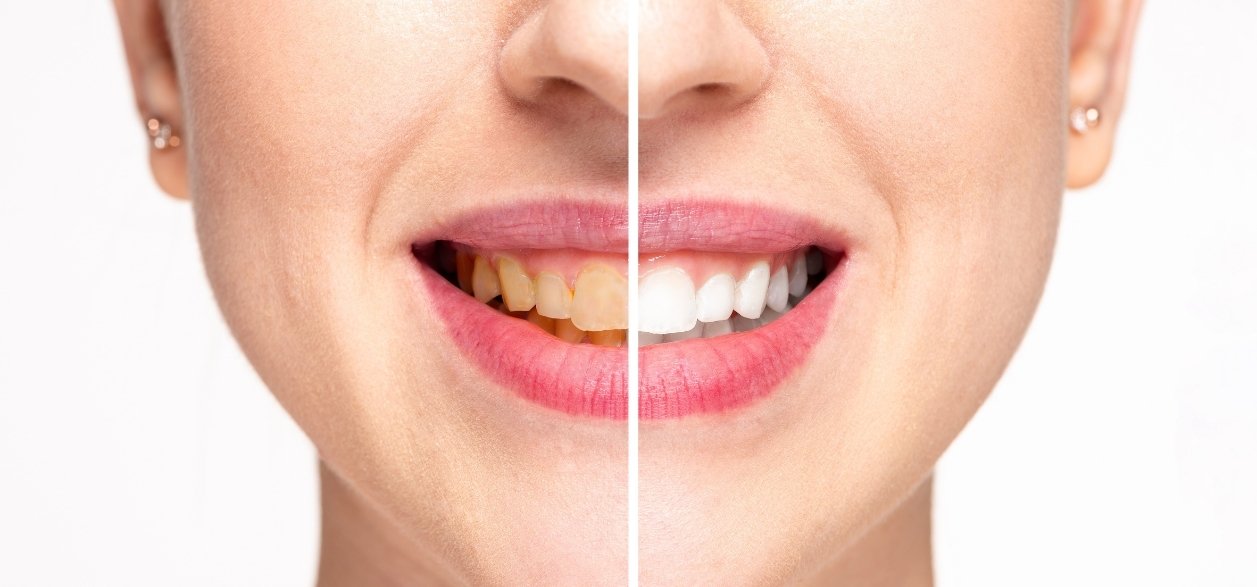
A radiant smile can boost your confidence and leave a lasting impression. Dental bonding is a popular cosmetic dentistry procedure that can address various dental issues, including chipped, stained, or misshapped teeth. One common question that arises is whether you can whiten your teeth if you have bonding. The answer is yes, but it requires a different approach compared to natural teeth whitening methods. In this informative blog, we’ll explore how you can whiten your teeth if you have bonding, the process involved, and important considerations.
Can You Whiten Teeth With Bonding?
Yes, you can whiten teeth with bonding, but it’s important to understand the nuances of the process. Dental bonding is a cosmetic procedure where a tooth-colored resin material is applied to the teeth. It’s then hardened with a special light, bonding it to the natural tooth structure. While the bonding material itself does not respond to traditional teeth whitening treatments like natural enamel, there are ways to whiten your teeth to achieve a more uniform appearance.
How to Whiten Teeth With Bonding
Professional Teeth Whitening
Consult with your dentist to determine the best approach for whitening your teeth with bonding. Professional teeth whitening treatments, such as in-office whitening or take-home kits prescribed by your dentist, can effectively whiten natural teeth while preserving the integrity of the bonding material.
Composite Resin Bonding
If your bonding material has become discolored over time, your dentist may recommend replacing or repairing the bonding. It helps to match the new shade of your whitened teeth. Composite resin bonding can be color-matched to your whitened teeth for a seamless blend.
Veneers
In some cases, your dentist may recommend porcelain veneers as an alternative to traditional teeth whitening. Veneers are thin shells of porcelain that are bonded to the front surfaces of your teeth, covering any imperfections, including discolored bonding material.
Avoid DIY Whitening
Avoid over-the-counter whitening products or DIY remedies, as they may not be suitable for teeth with bonding and could potentially damage the bonding material.
Regular Dental Check-ups
Maintain regular dental check-ups to monitor the condition of your bonding and ensure that any necessary touch-ups or adjustments are made.
Avoid Staining Foods and Drinks
Certain foods and drinks, such as coffee, tea, and red wine, can stain your teeth and bonding. Try to limit your intake of these items or brush your teeth shortly after consuming them to reduce the risk of staining.
Benefits of Whitening Teeth With Bonding
Enhanced Aesthetic Appeal: Whitening your teeth can significantly improve the overall appearance of your smile. By removing stains and discoloration from both your natural teeth and the bonding material, you can achieve a brighter, more youthful-looking smile.
Improved Confidence: A bright, white smile can boost your confidence and self-esteem. When you feel good about your smile, you’re more likely to smile more often, which can have a positive impact on your personal and professional interactions.
Long-lasting Results: Professional teeth brightening treatments can provide long-lasting results, especially when combined with proper oral hygiene habits. By following your dentist’s recommendations and maintaining regular dental check-ups, you can enjoy a brighter smile for years to come.
Preservation of Bonding Material: Professional teeth whitening treatments are designed to be safe for both your natural teeth and any dental bonding you may have. Unlike abrasive over-the-counter whitening products, professional treatments are gentle on the bonding material, helping to preserve its integrity.
Customized Treatment: Your dentist will create a customized whitening plan based on your specific needs and goals. They will take into account the color stability of the bonding material and your desired outcome to achieve the best possible results.
Overall Oral Health: Whitening your teeth with bonding can also contribute to your overall oral health. By removing stains and discoloration, you may be more motivated to maintain good oral hygiene habits, such as brushing and flossing regularly.
Cost-effective Solution: Teeth whitening is a cost-effective way to enhance your smile compared to more invasive procedures like veneers or crowns. It can provide dramatic results with minimal time and expense.
Non-invasive Procedure: Professional teeth whitening is a non-invasive procedure that can be completed in a single visit to your dentist’s office or over a series of appointments, depending on your needs and preferences.
Considerations for Whitening Teeth With Bonding
Consult with Your Dentist
Before starting any whitening treatment, consult with your dentist to assess the condition of your bonding and determine the best approach for whitening your teeth. Your dentist will consider the type of bonding material used and any previous dental work to ensure that the whitening process is safe and effective.
Professional Whitening Recommendations
Your dentist may prescribe professional whitening treatments specifically formulated for teeth with bonding. These treatments are designed to whiten your natural teeth while minimizing any potential damage to the bonding material. Follow your dentist’s recommendations closely to achieve the best results.
Bonding Material’s Color Stability
Keep in mind that the bonding material may not whiten at the same rate as your natural teeth. The color stability of the bonding material can vary depending on the type of material used and how well it has been maintained. Your dentist can assess the bonding material’s color stability and make recommendations for achieving a uniform shade.
Avoid Harsh Whitening Products
When whitening bonded teeth, avoid abrasive products that may harm the bonding. Stick to dentist-recommended professional whitening treatments for safety on both natural teeth and bonding material.
Whitening your teeth with bonding is possible with the right approach and guidance from your dentist. By understanding the process involved and following professional recommendations, you can achieve a brighter and more confident smile. Consult with your dentist to explore the best whitening options for your teeth with bonding and enjoy the benefits of a dazzling smile.



